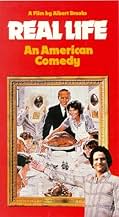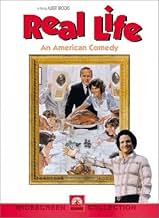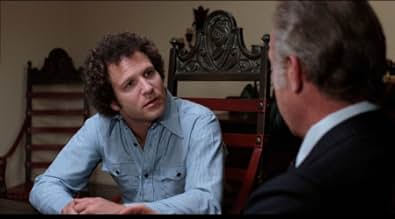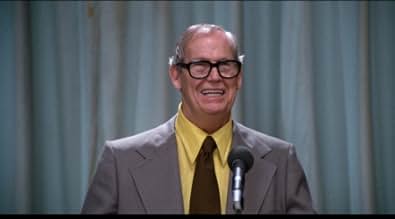AVALIAÇÃO DA IMDb
7,0/10
4,4 mil
SUA AVALIAÇÃO
Adicionar um enredo no seu idiomaA film crew sets out to record a year in the life of an average family, but things quickly start going wrong.A film crew sets out to record a year in the life of an average family, but things quickly start going wrong.A film crew sets out to record a year in the life of an average family, but things quickly start going wrong.
- Direção
- Roteiristas
- Artistas
- Direção
- Roteiristas
- Elenco e equipe completos
- Produção, bilheteria e muito mais no IMDbPro
Avaliações em destaque
Any Albert Brooks fan who has not seen his first glorious feature is truly missing out. As anyone can attest, Brooks has the rare gift of turning ordinary human moments into riotously funny scenes, and this film is full of such moments, plus much more subversive material, like the way Grodin's character repeatedly comes perilously close to committing a felony against his family.
Perhaps the greatest joke of all is that while the character "Albert Brooks" continuously states how he is documenting real life, we all know that this is really a star vehicle for him. He is more concerned with how much everything costs, like the head-held cameras (for those who haven't seen it, imagine the result of torrid affair between Dave Bowman and the Hal-9000). This film, more that anything, is a satirical take on how Hollywood subverts what is really "real life," all this coming from a director with as great a grasp on how humans relate to one another than anyone.
Perhaps the greatest joke of all is that while the character "Albert Brooks" continuously states how he is documenting real life, we all know that this is really a star vehicle for him. He is more concerned with how much everything costs, like the head-held cameras (for those who haven't seen it, imagine the result of torrid affair between Dave Bowman and the Hal-9000). This film, more that anything, is a satirical take on how Hollywood subverts what is really "real life," all this coming from a director with as great a grasp on how humans relate to one another than anyone.
This is, of course, a very funny film (it's Albert Brooks, after all). But it also shows the quantum uncertainty in "reality" television. By attempting to observe the experiment, the experiment is altered.
Albert Brooks and his film crew follow the hapless family in "Real Life", dressed in bizarre helmet-cams. Charles Grodin, his wife and children can't help but be constantly aware that cameras are present, and this leads to all sorts of atypical behaviour.
I mention CBS' reality shows in my summary because I remember seeing one of the Survivor contestants on "Politically Incorrect" claim that after a short while they forgot the cameras were on the island with them. What she couldn't grasp -- but Albert Brooks does -- was that while the cameras weren't foremost in their minds all the time, you can't help but be influenced by the peripheral knowledge that a big Betacam camera and mike boom are just a few feet from your so-called "reality".
Albert Brooks and his film crew follow the hapless family in "Real Life", dressed in bizarre helmet-cams. Charles Grodin, his wife and children can't help but be constantly aware that cameras are present, and this leads to all sorts of atypical behaviour.
I mention CBS' reality shows in my summary because I remember seeing one of the Survivor contestants on "Politically Incorrect" claim that after a short while they forgot the cameras were on the island with them. What she couldn't grasp -- but Albert Brooks does -- was that while the cameras weren't foremost in their minds all the time, you can't help but be influenced by the peripheral knowledge that a big Betacam camera and mike boom are just a few feet from your so-called "reality".
Albert Brooks (himself) undertakes an ambitious year long project documenting the lives of a typical American family. With the assistance of Psychological professionals and expensive testing and searching methods, Brooks' team selects the Yeager family of Phoenix, Arizona consisting of husband and wife Warren and Jeannette (Charles Grodin and Frances Lee McCain respectively) and their two children Lisa and Eric (Lisa Urette and Robert Stirrat respectively). As Brooks ingrains himself and his crew in the lives of the Yeager's the family come under ever increasing strain with Brooks' invasive presence in their lives.
Real Life is the directorial debut of comedian Albert Brooks. Brooks had attained prominence with his stand-up work as well as supporting parts on television and a bit role in Martin Scorcese's Taxi Driver. Brooks raised the money for the film's production budget himself and collaborated on the script Harry Shearer and Monica Johnson (the latter of whom would be a frequent collaborator with Brooks). When the film was released it received mixed reviews with much praise aimed at Charles Grodin's performance as Warren Yeager, but criticism directed at Brooks' "one note" performance. While the film did have champions such as Gene Siskel who claimed the film to be one of the funniest of the year, most critics liked the idea more than the execution. Real Life has some truly biting moments of satire and early signs of the promise of Brooks' future in the director's chair, there is a roughness in the execution that holds the movie back.
The fact that Harry Shearer is a co-writer on this film is rather appropriate, as it feels like a rough outline of ideas that would be adopted for a future mockumentary he'd be involved with, in This is Spinal Tap. The movie is very prescient with its satirization of PBS' An American Family where the invasiveness of cameras in one's life doesn't capture reality so much as distort it. Real Life feels like an indicator of what would serve as the template for reality TV with the reality often taking a backseat to Albert Brooks where the family are almost secondary characters in the movie that should be about them. The movie has some really strong moments of cutting humor with scenes such as the gynecologist office being uncomfortably funny. But there are also instances where the movie will abandon the Yeager family for long stretches as we focus on Albert Brooks negotiating with his Psychology advisors or studio executives in what are basically variations on the same point. While the central joke of the movie is in how Albert Brooks' character is making the movie more about him than the Yeagers (down to the fact he moves in across the street from them) most of the strongest set pieces are focused on the Family's interactions as they deal with the invasiveness of cameras in their lives but too often the family are sidelined. With that said there is some really funny material here that is both funny and intelligent but it's also rough and lacking in polish that comes from experience.
Real Life while moderately funny serves as more of a template for films such as This is Spinal Tap or Christopher Guest's filmography. It wouldn't be unfair to say that Real Life walked so that those future films could run and become the enduring classics they are. If you are a fan of those mockumentary style comedies like Best in Show or Waiting for Guffman then Real Life works as both an amusing diversion and a prototype of this type of comedic format. Slightly dated in some aspects, but predictive and ahead of its time in others.
Real Life is the directorial debut of comedian Albert Brooks. Brooks had attained prominence with his stand-up work as well as supporting parts on television and a bit role in Martin Scorcese's Taxi Driver. Brooks raised the money for the film's production budget himself and collaborated on the script Harry Shearer and Monica Johnson (the latter of whom would be a frequent collaborator with Brooks). When the film was released it received mixed reviews with much praise aimed at Charles Grodin's performance as Warren Yeager, but criticism directed at Brooks' "one note" performance. While the film did have champions such as Gene Siskel who claimed the film to be one of the funniest of the year, most critics liked the idea more than the execution. Real Life has some truly biting moments of satire and early signs of the promise of Brooks' future in the director's chair, there is a roughness in the execution that holds the movie back.
The fact that Harry Shearer is a co-writer on this film is rather appropriate, as it feels like a rough outline of ideas that would be adopted for a future mockumentary he'd be involved with, in This is Spinal Tap. The movie is very prescient with its satirization of PBS' An American Family where the invasiveness of cameras in one's life doesn't capture reality so much as distort it. Real Life feels like an indicator of what would serve as the template for reality TV with the reality often taking a backseat to Albert Brooks where the family are almost secondary characters in the movie that should be about them. The movie has some really strong moments of cutting humor with scenes such as the gynecologist office being uncomfortably funny. But there are also instances where the movie will abandon the Yeager family for long stretches as we focus on Albert Brooks negotiating with his Psychology advisors or studio executives in what are basically variations on the same point. While the central joke of the movie is in how Albert Brooks' character is making the movie more about him than the Yeagers (down to the fact he moves in across the street from them) most of the strongest set pieces are focused on the Family's interactions as they deal with the invasiveness of cameras in their lives but too often the family are sidelined. With that said there is some really funny material here that is both funny and intelligent but it's also rough and lacking in polish that comes from experience.
Real Life while moderately funny serves as more of a template for films such as This is Spinal Tap or Christopher Guest's filmography. It wouldn't be unfair to say that Real Life walked so that those future films could run and become the enduring classics they are. If you are a fan of those mockumentary style comedies like Best in Show or Waiting for Guffman then Real Life works as both an amusing diversion and a prototype of this type of comedic format. Slightly dated in some aspects, but predictive and ahead of its time in others.
"Only six of these were ever made. Only five ever worked. We have four of those." IMHO this is the best movie Brooks ever made. He plays an egocentric, inept film director who turns a simple movie into a botched science experiment. The high-tech gadgetry is ultra low-tech these days. It's a gem of a movie. If you haven't seen it, it is well-worth renting -- or buying.
I think what most filmmakers say when they watch a great film is "I wish I made that movie". This is one of those movies. Not only is this a comedy classic, I would say that this movie is ground breaking. And way ahead of its time. Albert Brooks, proves that he is one of the funniest comedians ever, and in my opinion one of the best actors on the screen. And the ending is simply brilliant, and at the same time "Hilarious". I would like to tell you more, "But I don't have the time, or the cord!"
Você sabia?
- CuriosidadesAlbert Brooks was under a great deal of pressure to finish the film on-budget, because he would have been personally responsible for any extra costs. During one particularly difficult filming day, he sat feeling totally dejected. Charles Grodin walked up to him and said, "I have to leave at 4." This totally ridiculous request was sufficient to cheer Brooks up.
- Erros de gravaçãoIn the opening sequence the U.S. flag and the Arizona state flag are in the wrong positions behind the speakers. They should be switched per proper protocol.
- Citações
Albert Brooks: [showing off a high-tech camera to be used in filming] Only six of these cameras were ever made. Only five of them ever worked. We have four of those.
- Cenas durante ou pós-créditosThe end credits finishes with a bar-code for Alka-Seltzer.
Principais escolhas
Faça login para avaliar e ver a lista de recomendações personalizadas
- How long is Real Life?Fornecido pela Alexa
Detalhes
- Data de lançamento
- País de origem
- Idioma
- Também conhecido como
- Real Life
- Locações de filme
- Phoenix Zoo - 455 N Galvin Parkway, Phoenix, Arizona, EUA(The Yeagers visit the zoo during the montage.)
- Empresa de produção
- Consulte mais créditos da empresa na IMDbPro
Bilheteria
- Faturamento bruto nos EUA e Canadá
- US$ 364.642
- Faturamento bruto mundial
- US$ 364.642
Contribua para esta página
Sugerir uma alteração ou adicionar conteúdo ausente



























